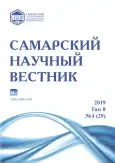Historical and pedagogical outlines of promoting ethnic tolerance in military pedagogy
- Authors: Vrachinskaya T.V.1, Budarina A.O.1, Kuznetsova T.A.1, Parakhina O.V.1, Kalyuzhniy E.V.1
-
Affiliations:
- Immanuel Kant Baltic Federal University
- Issue: Vol 8, No 4 (2019)
- Pages: 241-248
- Section: Pedagogical Sciences
- URL: https://journal-vniispk.ru/2309-4370/article/view/34498
- DOI: https://doi.org/10.17816/snv201984303
- ID: 34498
Cite item
Full Text
Abstract
The paper traces the historical and pedagogical outlines of promoting ethnic tolerance in military pedagogy. The philosophical and socio-political prerequisites for developing the attitudes on ethnic tolerance are revealed. The views of national teachers and the periodization of the development of attitudes on ethnic conflict and tolerance of military personnel in national military pedagogy are systematized. The study of the process of promoting and developing tolerance of Russian military personnel of the XVIII – beginning of the XXI centuries was carried out from the standpoint of extending the worldview principles to the spiritual activities and practices of all participants in the pedagogical process. At the same time, historical and pedagogical conditions and factors that influenced the process under the study and the degree of its development in the corresponding period were taken into account. The study has showed that the idea of the conditioning ethnic tolerance in Russian military pedagogy, its implementation in theoretical thought and practical activities underwent a certain evolution. The study of historical and pedagogical experience has made it possible to formulate the main trends in the emergence and development of the process of conditioning ethnic tolerance among military personnel at various historical stages in order to take into account the positive and negative experience of promoting ethnic tolerance. The experience of educating military personnel in various historical periods is undoubtedly useful for conditioning and promoting ethnic tolerance among cadets. At present, the development of ethnic tolerance among military personnel is no less relevant than in the considered historical periods.
Keywords
Full Text
##article.viewOnOriginalSite##About the authors
Tatiana Valerievna Vrachinskaya
Immanuel Kant Baltic Federal University
Author for correspondence.
Email: tanya-kgrd@rambler.ru
doctor of pedagogical sciences, associate professor, professor of Institute of Education
Russian Federation, KaliningradAnna Olegovna Budarina
Immanuel Kant Baltic Federal University
Email: annabudarina@mail.ru
doctor of pedagogical sciences, professor, director of Institute of Education, professor of Institute of Education
Russian Federation, KaliningradTatiana Arturovna Kuznetsova
Immanuel Kant Baltic Federal University
Email: tkuznetsova@kantiana.ru
candidate of pedagogical sciences, associate professor, deputy director of Institute of Education, associate professor of Institute of Education
Russian Federation, KaliningradOlesya Vladimirovna Parakhina
Immanuel Kant Baltic Federal University
Email: oparakhina@kantiana.ru
candidate of pedagogical sciences, leading manager for educational programs, associate professor of Institute of Education
Russian Federation, KaliningradEvgeniy Viktorovich Kalyuzhniy
Immanuel Kant Baltic Federal University
Email: kalyuzhnyy1983@mail.ru
postgraduate student of Institute of Education
Russian Federation, KaliningradReferences
- Military Pedagogies and Why They Matter // Educational Futures Rethinking: Theory and Practice / eds. T. Kvernbekk, H. Simpson, M.A. Peters. 2008. Vol. 25. P. 1–28.
- Juhary J. Understanding military pedagogy // Procedia – Social and Behavioral Sciences. 2015. Vol. 186. P. 1255–1261. doi: 10.1016/j.sbspro.2015.04.104.
- Асмолов А.Г. Историческая культура и педагогика толерантности // Мемориал. 2001. № 24. С. 61–63.
- Асмолов А.Г. Толерантность: различные парадигмы анализа // Толерантность в общественном сознании России. М.: ИЭА РАН, 1998. С. 15–20.
- Goodman S.W., Alarian H.M. National belonging and public support for multiculturalism // The Journal of Race, Ethnicity, and Politics. 2019. doi: 10.1017/rep.2019.52.
- Carus A. Tolerance // Carnap and Twentieth-Century Thought: Explication as Enlightenment. Cambridge: Cambridge University Press, 2007. P. 252–272. doi: 10.1017/CBO9780511487132.013.
- Бурмистрова Т.Ю., Дмитриев О.А. Дружбой сплоченные: Культура межнационального общения в СССР. М.: Мысль, 1986. 254 с.
- Волков С.В. Русский офицерский корпус. М.: Воениздат, 1993. 368 с.
- Андреев Г.П., Попов В.В. Многонациональный воинский коллектив: вопросы и ответы. М.: Воениздат, 1989. 175 с.
- Сукновалов А.Е. Первая в России военно-морская школа // Исторические записки. М.: АН СССР, 1953. Т. 42. С. 301–306.
- Румянцев П.А. Документы. М.: Воениздат, 1953–1959. Т. 3. 763 с.
- Хомяков М.Б. Толерантность в христианской философии // Философия и общество. 1999. Вып. 2. С. 157–184.
- Галушко Ю.А., Колесников А.А. Школа российского офицерства. М.: Русский мир, 1993. 223 с.
- Зубков А.А. Военно-патриотическое воспитание военнослужащих в советский военный и послевоенный период // Флагман: сб. науч. ст. № 7. Калининград: БВМИ, 2004. С. 24–29.
- Фрунзе М.В. Избранные произведения. М.: Воениздат, 1977. 480 с.
- Каменев А.И. История подготовки офицерских кадров в СССР (1917–1984 гг.). Новосибирск: НВВПУ, 1991. 261 с.
- Муцынов С.С. Коллектив и дисциплина: вопросы и ответы. М.: Воениздат, 1989. 167 с.
- Сергеева Е.В. Психолого-педагогический опыт формирования этнической толерантности курсантов в условиях военного вуза // Вестник Казанского технологического университета. 2009. № 3. С. 155–158.
- Китов А.И. Предупреждение и преодоление психологических конфликтов в коллективе // Социальная психология и управление. М.: ВПА, 1972. С. 180–195.
- Пляшкевич В.И. Воспитание воинов в духе дружбы народов. М.: Воениздат, 1973. 129 с.
Supplementary files






